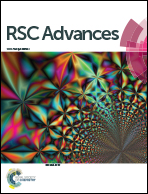Room-temperature production of bio-based aldehydes from vegetable oil-derived epoxide via H2WO4@Al-MCM-41 as recyclable catalyst
Abstract
The oxidative cleavage of vegetable oils and their derivatives to produce bio-based aldehydes is a potentially useful process, although the aldehyde products are readily oxidized to carboxylic acids and thus seldom obtained in high yields. The present study developed a room-temperature method for the synthesis of bio-aldehydes via the oxidative cleavage of vegetable oil-derived epoxides, using H2WO4 as the catalyst, H2O2 as the oxidant, and t-BuOH as the solvent. Reactions were carried out at temperatures ranging from 25 to 35 °C for 3.5–10.5 h, and provided >99% conversion and >90% aldehyde yield. In particular, an approximately 97% yield was obtained at 25 °C after 10.5 h. As the reaction proceeded, the H2WO4 dissolved to form a W-containing anion. Several mesoporous Al-MCM-41 materials having different Si/Al ratios were hydrothermally synthesized and used as adsorbents to recover the catalyst by adsorbing these anions. The adsorption capacity of the Al-MCM-41 was found to increase with decreases in the Si/Al ratio. The Al-MCM-41 had little effect on the oxidative cleavage reaction at 25 °C, and thus could be directly added to the reaction system. The excellent anion adsorption performance of the Al-MCM-41 greatly improved the reusability of the H2WO4 catalyst. When using the Al-MCM-41 with the best adsorption performance, there was no significant decrease in the activity of the catalyst following five reuses.



 Please wait while we load your content...
Please wait while we load your content...